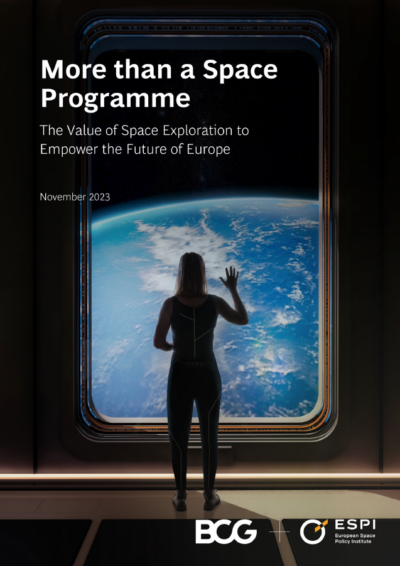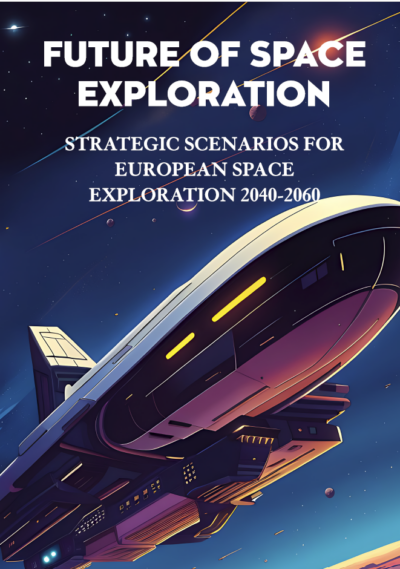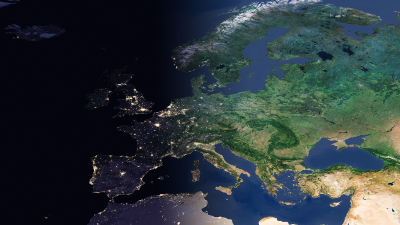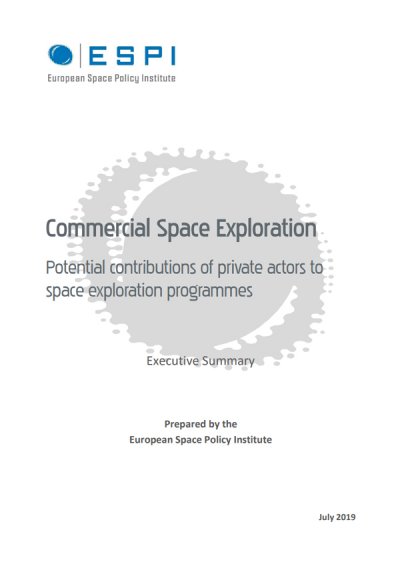While the era of the ISS as the only permanently inhabited orbital outpost is coming to an end, space exploration appears to be one of the most strategic and essential aspects for becoming a global space power. Certainly, a plethora of recent developments in space exploration and human spaceflight indicate a shifting evolution towards new international ambitions, and dynamism in space, strongly enhancing the value of space for the broader economy and society.
Deep dive into ESPI’s joint report with Boston Consulting Group (BCG) on the exciting benefits of space exploration for Europe here.
This report provides the findings of a study jointly conducted with Boston Consulting Group (BCG) to quantify the induced and catalytic economic impact of a bold European Mission for Space Exploration.
It is meant as a contribution to a plan for a transformation and invigoration of the European space ecosystem, as requested in the “Revolution Space” report published in March 2023 by the High-Level Advisory Group on Human and Robotic Space Exploration for Europe, and in preparation for the Space Summit held in Sevilla on 6-7 November 2023.
The report demonstrates that a bold European space exploration programme could provide a plethora of benefits exceeding the immediate contribution of its core activities and propagating up to the level of the overall economy and society, thus affecting every aspect of human activities both on earth and in space.
A three-step methodology has been employed to analyse the various economic benefits that Europe can gain from space exploration. These benefits encompass:
- Direct, indirect, induced, and catalytic benefits: The implementation of a major European space exploration programme would allow for the building of core capabilities and assets within the industrial ecosystem and the establishment of an independent presence in low Earth orbit, lunar orbit, on the Moon, and beyond. In Europe, such commitment would generate a GDP multiplier effect of >5x the overall budget, with estimated benefits stemming from the investment amounting to a cumulative GDP impact of at least €260 billion and an average of 90,000 FTEs created between 2025 and 2040, considering an investment of €50 billion over the same period.
- Cross-fertilisation benefits within the space industry: Space exploration provides additional cross-fertilisation benefits for other space domains, including launchers and for such new markets as on-orbit servicing and manufacturing.
- Significant broader improvements and outcomes for the economy and society at large: Space plays a critical role in providing scale to the industrial ecosystem, in enabling economies of scale, and serving as a vehicle for increasing competitiveness. Investment in space exploration cannot be dissociated from the overall investment in space and the economic benefits enhanced by space, beyond the space programme, for the whole economy and its sectors.
The report shows that these benefits are inseparable and can only be achieved as a whole within a European space industry operating at scale and that is globally competitive. Indeed, the development of core space exploration capabilities is pivotal to unlock cross-fertilisation effects for the space industry and, therefore, enhance value generation for the broader economy and society.
The study was funded by ESA, as an independent assessment performed by ESPI and BCG. The findings and conclusion or recommendations expressed in the study are those of the authors and do not necessarily represent the views of ESA.






